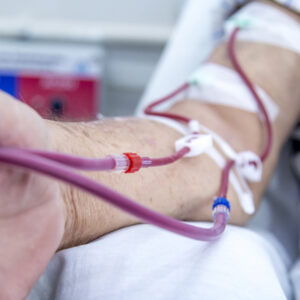
Hemodialysis
Hemodialysis is a procedure to filter water and waste from your blood, just like your healthy kidneys do. Hemodialysis helps regulate vital blood minerals like potassium, salt, and calcium as well as blood pressure. Healthy kidneys purify your blood and eliminate excess fluid in the form of urine. They also create substances that are beneficial to your health. When your kidneys stop working, dialysis takes over some of these functions. Dialysis is classified into two types: hemodialysis and peritoneal dialysis. The following information is about hemodialysis.
When Is Hemodialysis Necessary?
If your kidneys are no longer eliminating enough fluid and waste from your blood to keep you healthy, hemodialysis may be necessary. When your kidney function is barely 10% to 15% or less, this typically happens. You might feel nauseous, throw up, swell, and be exhausted. You might have a high concentration of wastes in your blood that are hazardous to your body even though you don’t have these symptoms. Seek the help of a professional. The best person to give you advice on when to start dialysis is your Doctor.
Symptoms Of Hemodialysis
- Acute kidney damage
- Encephalopathy caused by uremic acid
- Pericarditis
- Hyperkalemia can be fatal
- Acidosis with refractory symptoms
- End-organ complications caused by hypervolemia (e.g., pulmonary edema)
- Malnutrition and failure to thrive
- Neuropathy of the periphery
- Constant gastrointestinal symptoms
- Patients who are asymptomatic and have a GFR of 5 to 9 mL/min/1.73 m2
Causes Of Hemodialysis
- Diabetes
- Blood pressure that is too high (hypertension)
- Inflammation of the kidneys (glomerulonephritis)
- Cysts in the kidneys (polycystic kidney disease)
- Kidney diseases that are inherited
- Long-term use of nonsteroidal anti-inflammatory drugs or other medications that may cause kidney damage

© Triage Healthcare All rights reserved — Made by Rittz Digital


